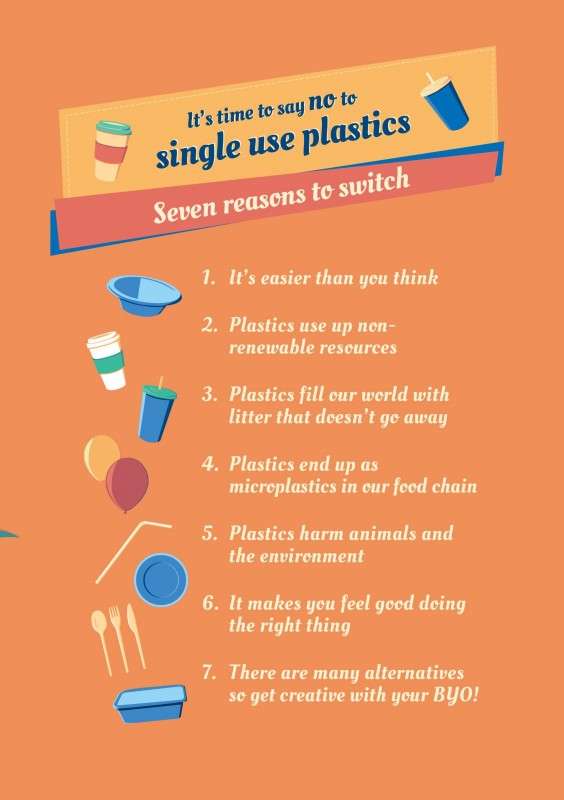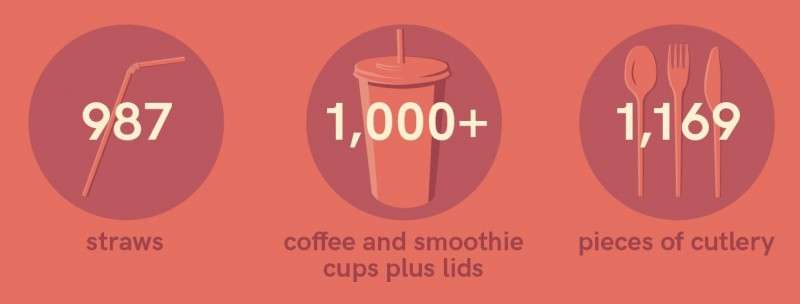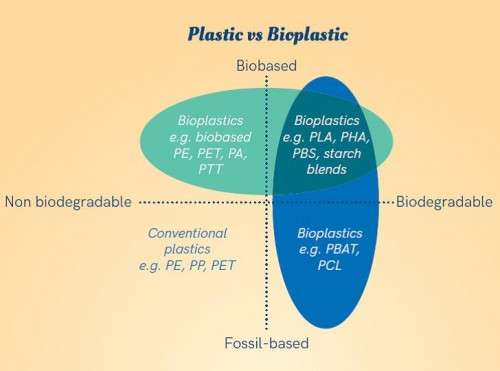It's time to say NO to single use plastics
Going plastic free, reducing your waste and environmental impact is easier than you think. In some cases, it will even save you money rather than costing the earth.
City of Darwin has made changes to the types of disposable items that can be used at events on council land and at Darwin’s markets. These changes have been implemented to reduce the amount of single use plastic used and to help protect Darwin’s unique environment.
Your guide to making the switch from single use disposable plastic
What are the changes?
Single use plastic items including disposable coffee cups, smoothie cups, lids, straws, cutlery, stirrers, plates, bowls and takeaway containers. These are being phased out from use on council land from 1 January 2019. This includes a ban on any deliberate release of helium balloons.
What are single use plastics?
Single use plastics are disposable items that are typically used once for a few minutes before being thrown away, such as straws, disposable cups, and containers. We concentrate on:
- Disposable cups (coffee and cold) and lids
- Cutlery (and stirrers)
- Plates and bowls
- Takeaway containers
- Straws
- Balloons.
Single use plastics are made from oil and put pressure on our earth’s valuable resources while creating unnecessary waste. These items are commonly found as litter and are a significant part of the pollution being swept into our waterways and oceans. There, they partially degrade, harming marine life and affecting human health.
What can I do?
- Bring reusable containers for food and drink as well as your carry bags.
- If you purchase takeaway coffee or food, you may want to invest in a BYO (Bring Your Own) kit of reusable, washable cup, container, straw and cutlery.
- Encourage others to BYO and share your tips and tricks on what to use and do instead.
- If you forgot your BYO find a stall that has reusable plates, or head to the community wash hub to borrow one.
- Check if the stall you’re buying from uses compostable items.
- Ask your local takeaway outlet if they use compostable items.
- If you’re organising an event – make it plastic free!
- Identify places that discount coffee or meals when you BYO.
Why go plastic free?
Single-use plastics are made from oil and put pressure on our earth’s valuable resources while creating unnecessary waste. These items are commonly found as litter and are a significant part of the pollution being swept into our waterways and oceans. There, they partially degrade, harming marine life and affecting human health.
|
Plastic becomes litter and never goes away, it just breaks down into smaller pieces. |
|
|
Plastics use precious resources. Most plastics are made from crude oil and other chemicals. |
|
|
Plastics harm the environment and local wildlife. |
|
|
It can be cheaper to go plastic free – and it won’t cost the Earth.
|

Compostable or reusable?
Reducing the waste Darwin produces and diverting it from landfill is a high priority for City of Darwin.
Avoiding packaging altogether is always the preferred option. Reusable containers are one way to achieve this, so BYO today.
Didn’t realise you were going to pop in to the markets? Didn’t bring a container? That’s ok. This is why having compostable disposable alternatives is important.
One recent Darwin market waste audit revealed the following items:

City of Darwin believes that reusing our waste and diverting it from landfill is an environmentally sustainable change.
FAQs
- What are single use plastics?
-
Single use plastics are disposable items that are typically used once for a few minutes before being thrown away. These products are made from oil and are used for packaging or consuming food and drink. They include straws, disposable cups, plates, cutlery, containers, food wrappers, balloons and disposable coffee cups.
- Can customers legally bring their own containers?
-
Food Standards Australia New Zealand (FSANZ) does not set down any regulations about customers bringing their own containers when purchasing food. Most businesses happily accept a BYO container to save them money. However, if you bring dirty or unhygienic container businesses have the right to refuse to use it.
- What is bioplastic? And, is it any better?
-
Bioplastic is a substance made from organic sources, unlike conventional plastic, which is made from petroleum. Bioplastic contains vegetable oils, cellulose and starches.
Some biodegradable bioplastics can break down in 180 days, given the right conditions. Others are not biodegradable at all. City of Darwin is banning plastics from council land that are non-degradable in both fossil-based and bio-based categories. If a compostable option (cardboard, wood, plant material) cannot be found for your product then a bioplastic may be used. The bioplastic must be bio-based and biodegradable - fitting into the overlapping green and blue areas of the graphic.
- Won’t the alternative products just go to landfill anyway?
-
City of Darwin has plans for a commercial composting facility that will deal with compostable waste from our marketplaces, homes and businesses.
- Don’t biodegradable products melt and disintegrate in our hot and humid climate?
-
Technology around biodegradable and compostable products is constantly evolving. Many products these days are well suited to a variety of conditions and uses.
- What are Darwin’s usual smoothie and coffee cups made from?
-
These are made from cardboard (corrugated or double layered for hot liquids and single layered for cold) and are lined with a thin layer of plastic. This plastic layer and the lids are made from petroleum.
- Can smoothie and coffee cups be recycled in Darwin?
-
Smoothie and coffee cups are not currently recyclable in Darwin. If large numbers of these are found in the recycling stream, the whole load must be taken to landfill.
- Where can I purchase reusable or environmentally friendly single use containers?
-
City of Darwin has been working with local distributors and businesses to ensure that there is an ample supply of appropriate packaging available for purchase. We want to ensure that putting these changes into practice is easy, affordable, and achievable for everyone. Check out suppliers such as Vegware, Biopak, or Earthen for a product that suits you.
- By what date must businesses have made the switch away from single use packaging?
-
Market stalls will start transitioning away from single use plastic from 1 January 2019. Many stalls have already made the switch and are using environmentally friendly compostable products. Using up current stock for some businesses may take a few weeks, however well before the end of 2019 it is envisaged our markets will be single use plastic free!
For more information on going plastic-free reducing your waste and environmental impact contact the Climate Change and Environment Team.
Email: environment@darwin.nt.gov.au
Tel: 08 8930 0629
